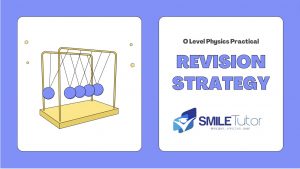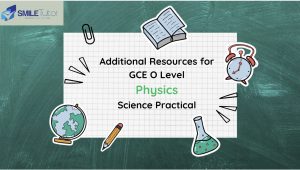
Achieving proficiency in the O Level Physics Practical exam is a crucial milestone for students dedicated to academic achievement. This facet of the GCE O Level Physics assessment not only assesses theoretical comprehension but also demands practical competence in laboratory environments.
Within this comprehensive guide, we will explore various subjects, including the format of the O Level Physics Practical Exam, fundamental practical skills essential for O Level Physics, and effective strategies for revision and studying. Additionally, we will share invaluable tips and techniques to assist you in navigating and excelling in the O Level Physics Practical exam.
The ultimate aim of this guide is to empower students with the knowledge and methodologies required to confidently approach practical experiments and accurately interpret their outcomes. Let us embark on this journey together as we delve into the realm of O Level Physics Practical examination preparation!
- Understanding the O Level Physics Practical Exam Format
- Overview of the exam format and structure
- Weightage of practical in overall grade
- Key topics typically covered in the practical exam
- Revision Strategy for O Level Physics Practical
- Common mistakes to avoid for O Level Physics Practical
- Additional Resources and Further Reading
- Conclusion
Understanding the O Level Physics Practical Exam Format
Starting to prepare for the O Level Physics Practical Exam might feel scary, but don’t worry – knowing how the practical science exams are set up is your first step to doing well.
In this part, we’ll look closely at how the O Level Physics Practical Exam is organized. We’ll begin with a detailed look at the format of the exam, including how much it counts towards your final grade. Then, we’ll talk about the main topics you’ll need to know for the practical exam.
Think of this part as your guide.
It’ll help you understand what to expect in the exam and how to get ready for it. You’ll learn about the different tasks you might have to do, how the exam is arranged, and the best ways to prepare for each part.
Overview of the exam format and structure
The O Level Physics Practical Exam is a vital component of your Physics education, aiming to evaluate your practical abilities and grasp of experimental methods. Let’s break down what this exam typically entails:
-
Format
The practical exam is usually divided into sections or experiments, each assessing different Physics skills.
-
Duration
You’ll have 1.5 hours to complete each experiment, allowing ample time for observations and conclusions.
-
Types of Experiments
Expect a variety of standard laboratory procedures, including experiments like Measurement of Acceleration Due to Gravity and the principle of moments, involving observation, measurement, and result interpretation.
-
Assessment Criteria
Your performance is judged on accuracy, method correctness, clarity of observations, and analytical abilities with experimental data. It’s not just about the correct answer but also the process.
-
Safety and Procedure
Adhering to lab safety rules and procedures is crucial. The exam evaluates not only Physics skills but also your ability to work safely and systematically in a lab.
-
Questions and Report Writing
Besides conducting experiments, you’ll likely answer related questions and write reports. These assess your understanding of experiment concepts and data interpretation skills.
Understanding this exam structure is essential for effective preparation. Each part presents an opportunity to demonstrate your practical Physics skills. Practice, review notes, and approach experiments systematically to excel.
Weightage of practical in overall grade

The O Level Physics practical exam makes up 15% of your total grade, so it’s important to dedicate time to both theory and practical skills.
Doing well in the practical part can really improve your overall score, but if you don’t do well, it can bring your grade down. Keep in mind that the GCE O Level science exam evaluates not just what you know in theory, but also how well you can put that knowledge into practice.
To get the best grade possible, make sure you’re paying attention to both parts of the exam.
Key topics typically covered in the practical exam
In the O Level Physics practical exam, there are several key topics that you can expect to encounter. Here’s a brief overview of what these topics usually include:
-
Investigation of Simple Harmonic Motion (SHM)
In this experiment, students study the behavior of a mass-spring system or a simple pendulum undergoing simple harmonic motion. It involves students analyzing the relationship between period, mass, and amplitude.
-
Measurement of Specific Heat Capacity
This experiment typically involves students using a calorimeter setup to heat a known mass of substance and measure the temperature change. They are then required to calculate the specific heat capacity by applying the principle of conservation of energy.
-
Investigation of the Effect of Temperature on Resistance
In this experiment, students are usually asked to set up a circuit with a resistor and a variable resistor (thermistor or metal wire). By measuring resistance at different temperatures, students will be tested on their knowledge of the temperature coefficient of resistance and observe how resistance changes with temperature.
-
Measurement of Density of Object
In this experiment, students are tasked with determining the density of a liquid or an irregularly shaped solid. By comparing the weight of the object to the weight of the displaced water, students will be tested on their knowledge of how density is calculated.
-
Demonstration of the Principle of Moments
In this experiment, students explore the principle of moments through varying the masses and their distances from the pivot until the lever system is in equilibrium. By measuring the distances and masses and calculating the moments, students verify the principle of moments.
By practicing and understanding the flow and structure of each experiment, you will be better prepared on the day itself. Also remember to note down any common mistakes and any formulas you use for these experiments.
Do note that the list above is not exhaustive. Please consult your teacher for more clarity.
Revision Strategy for O Level Physics Practical

Now that we have a better understanding of the format and structure of the exam, we need to prepare for it. But we do not want to just practice blindly. We want to practice as effectively as possible. And for that, we need a plan. Remember, “Fail to plan, plan to fail” …
Review key Physics concepts
The first mistake a lot of students make is to skip the basics and go straight to doing the past year papers.
DO NOT DO THIS! It is highly ineffective and you end up wasting more time…
Build your foundation first. Having a strong grasp of basic Physics concepts like usage of appropriate formulas, uncertainty and error analysis etc. They are the foundational knowledge for completing the majority of all practical tasks.
Attend all lab sessions
Once you are proficient at the basics, it’s time to test your foundation. Attend all your lab sessions!
DO NOT SKIP ANY OF IT!
There are only so many lab sessions available as everyone is preparing for the practical exam and there is a limited supply of labs.
Take note of the main concept that the lab sessions are testing you for. Is it the principle of moments? Density? Refraction? This is crucial as your teachers may be indirectly hinting at you what the potential exam might be about.
Work on weak areas
After each practical, review your mistakes…DO NOT IGNORE YOUR MISTAKES! It is crucial in helping you identify your weaker areas so that you do not make the same mistake again.
Understand where you went wrong.
Is it a careless mistake? A unit conversion issue? A conceptual error? By asking yourself these questions, you will be able to identify what you need to focus on improving. If you are stuck, ask your teacher for help to clarify your doubts.
Attempt past year papers
If you are thinking of using past year Physics practical exam papers, remember to treat every practice like the real thing.
FINISH IT IN ONE SITTING!
That means finishing the paper in 1.5 hours, writing up reports and doing data interpretation. By consistently practicing under simulated exam conditions, you will be better prepared when the actual exam comes around.
Lastly, utilize visual learning tools like diagrams and videos for understanding complex processes and experiments.
Common mistakes to avoid for O Level Physics Practical
Now that we have gone through how to prepare for the GCE O Level Physics Practical exam, let’s delve into some common mistakes that you should avoid making during the Physics practical exam.
By understanding the common pitfalls for different experiment types, you can ensure that the data you collect is accurate. This allows you to make better inferences and conclusions which ultimately help you score better in the exam.
Principle of Moments
As seen in the earlier section, The Principle of Moments experiment in the O level physics practical exam requires students to explore the equilibrium of an object by balancing torques to demonstrate the relationship between force, distance, and equilibrium.
Here are some common mistakes that you should avoid making to get accurate results:
- Incorrect Measurement of distance from the pivot point to the point of application of force
- Misreading the scale on the force meter
- Improper balancing of forces on both sides of the pivot
- Neglecting the Effects of Friction between moving parts or surfaces
- Conducting experiments only once without repeating measurements
- Not ensuring system equilibrium before taking measurements
- Not calibrating measuring instruments such as rulers, force meters, or balances
Simple Harmonic Motion (SHM)
The Simple Harmonic Motion experiment, another common setup, is carried out to test O Level Physics students on their understanding of oscillating systems.
Here are some common mistakes that students make when conducting SHM experiments:
- Incorrect Measurement of Oscillation Period due to timing errors or improper counting of oscillations.
- Failure to Account for Damping due to air resistance or friction.
- Improper Calibration of Equipment such as stopwatches or timers
- Conducting experiments only once without repeating trials multiple times
- Poor Experimental Setup of the oscillating system
Measurement of Specific Heat Capacity
Students often make mistakes in the Measurement of Specific Heat Capacity experiment during O Level Physics practical exams.
Here are some common ones:
- Not waiting long enough for the temperature to stabilize before recording.
- Not aligning themselves at eye level when reading the thermometer.
- Not zeroing the balance before placing the objects.
- Not properly insulating the calorimeter (beaker) to minimize heat loss to the surroundings.
- Using bare bands to handle the beaker, introducing unwanted heat transfer.
- Not stirring the water regularly to ensure uniform temperature distribution in the beaker.
Investigation of the Effect of Temperature on Resistance
Students performing the “Investigation of the Effect of Temperature on Resistance” experiment in the O Level Physics practical exam can fall prey to several common mistakes:
- Not securely connecting the multimeter, leading to incorrect resistance measurements
- Taking readings too early and not ensuring the entire resistor has reached desired temperature.
- Inconsistent heating methods, leading to uneven temperature distribution.
- Skipping control readings at room temperature.
Measurement of Density of Object
Last but not least, these are some of the common mistakes students make when measuring the density of an object during the O Level Physics practical examination:
- Failing to clean and dry the measuring cylinder before readings
- Incomplete submersion of the object
- Not directly transferring the displaced water into the measuring cylinder for precise volume determination.
- Parallax error when reading the water level.
And there you have it, common mistakes we see students make during experiments that lead to inaccurate data, and hence conclusions which cost them precious grades.
Please be aware of these common mistakes and do not make them during the practical exam!
Additional Resources and Further Reading

Congratulations for making it this far!
In this section, we will be sharing with you some additional resources that will help you in preparation for the GCE O Level Physics Practical Exam.
The best one we have found is a compilation of past year practical notes and questions for the Physics Practical exam. The science practical notes feature a comprehensive list of past year questions from 2014 – 2023.
You can grab a copy of it from the Popular Bookstore.
Conclusion
We hope this guide has been helpful to you in better understanding what O Level Science practical is about and how to go about preparing for it.
As a final recap, solidifying your foundation in Physics is key to excelling in practical exams. Remember to regularly revisit core concepts to ensure a strong grasp of the underlying principles. This will equip you to tackle practical tasks with a clear understanding and avoid common pitfalls.
Please please please attend all your Physics lab sessions actively. This allows you to practice applying concepts in a practical setting, ensuring you are ready and calm when the real exam comes.
Lastly, always review past mistakes from practical exams! By identifying areas for improvement and understanding the root causes of errors, you can effectively address them in future endeavours.
Don’t hesitate to seek clarification from your teacher. They are a valuable resource to address any doubts or uncertainties you may encounter during your studies or practical work.
Finally, best of luck in taking your GCE O Level Physics Practical exam! You got this!
Check out our GCE O Level Chemistry Practical and GCE O Level Biology Practical exam guides!
